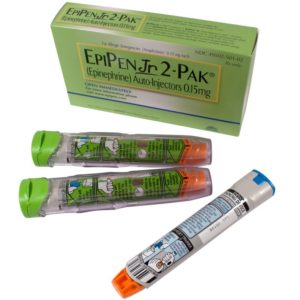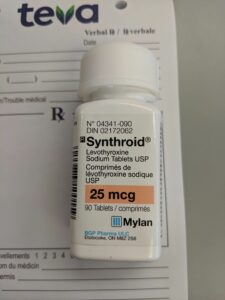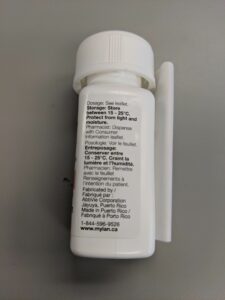by Gabriel Levitt, President, PharmacyChecker.com and Prescription Justice | Aug 16, 2018 | Drug Safety
 EpiPen, the emergency epinephrine auto-injector medicine, is in short supply in the U.S. and other countries, such as the U.K. and Canada. Now, parents of kids who need to carry around EpiPen Jr. are not just worried about the cost of EpiPen but if they can get it at all. If you are considering buying EpiPen online, here’s my warning:
EpiPen, the emergency epinephrine auto-injector medicine, is in short supply in the U.S. and other countries, such as the U.K. and Canada. Now, parents of kids who need to carry around EpiPen Jr. are not just worried about the cost of EpiPen but if they can get it at all. If you are considering buying EpiPen online, here’s my warning:
Only Buy EpiPen from Verified Online Pharmacies
When it comes to fast-acting, life-saving products, buying online from a rogue online pharmacy can turn out to be deadly. If you get a fake or expired product, then it might not work. Enough said. The message is clear: do NOT buy from an online pharmacy that isn’t one associated with your neighborhood pharmacy. If you decide to buy online, stick to online pharmacies that are verified. That includes online pharmacies verified by us, PharmacyChecker, or LegitScript, the National Association of Boards of Pharmacy VIPPS program, or the Canadian International Pharmacy Association.
You can buy brand-name EpiPen online from Canada using verified online pharmacies: a two pack for about $230.
Buy Generic EpiPen at U.S. Pharmacies
When it comes to cost and availability, you may not have to look internationally for savings. In the U.S., there’s a generic version made by the same company that makes the brand version, and it’s much less expensive. According to GoodRx, you can buy the generic with a discount coupon for almost half the price of the brand-name sold at Canadian online pharmacies: $125. The brand version in the U.S. is over $600!
Where are all the EpiPens?
According to Market Watch, manufacturing problems are causing EpiPen supply problems. The generic drug company, Mylan, has the license to market and sell EpiPen in the U.S. and Canada, but the brand-name drug company, Pfizer, owns and runs the plant that makes the drug. To make a very long story short, the FDA has cited problems with Pfizer’s protocols for assembling the drug. Pfizer is trying to up its game, but the process is taking some time.
There are epinephrine alternatives to EpiPen, brand and generic. They include Adrenally and Auvi-Q, which might be more affordable. Consumer Reports has a good article on these products, although I’m not sure about their current availability.
The Market Watch article suggests that you can still get the product, but they make it seem a lot more challenging than it should be. If you choose to buy it online, whether for availability or cost, stick to verified sites.
Tagged with: EpiPen, mylan, Pfizer, shortages
by Gabriel Levitt, President, PharmacyChecker.com and Kelly Ann Barnes, JD, RPh, Vice President, Pharmacy Verification and Information | Nov 18, 2016 | Drug Prices, Drug Safety, Narrow Therapeutic Index

[Update June 2019: Some comments on this blog post may lead readers to believe the Canadian version of Synthroid “works better” than the ones sold in the U.S. or India, and vice versa. Different people respond to medications differently, hence why it’s difficult to affirm one “works” better than the other.
On the subject at hand, we believe that the Synthroid sold in the U.S. and that sold in Canada are the same medication, based on the below pill bottles sold in Canada and our contact with Abbvie concerning Synthroid sold in the U.S.

Synthroid sold in Canada is manufactured in Puerto Rico

We contacted Abbvie about Synthroid’s origins and they responded:
Synthroid marketed in the United States is manufactured in the United States, Puerto Rico, and Ireland (Data on file, AbbVie). AbbVie sources ingredients for Synthroid marketed in the United States from the United States, Puerto Rico, France, Italy, Japan, Mexico, and Germany.
This information is subject to change. If this information is needed in the future, please contact AbbVie Global Medical Information for updated information.
Thank you for continuing the conversation.]
Synthroid is the brand name for a medication called levothyroxine, which is manufactured by drug company Abbvie in the U.S. and Mylan in Canada. It treats hypothyroidism, as well as enlarged thyroid gland and thyroid cancer. Synthroid sells for about $100 for a three-month supply in the U.S. compared to $32 in Canada. Over the course of a year, since this is a maintenance medication, the annual costs are $400 vs. $128. You compare Synthroid brand prices here. This is a very popular drug: about 23 million prescriptions are written monthly for Synthroid. For Americans who do not have insurance or their insurance doesn’t cover Synthroid, buying it from Canada means real savings. But will they be getting the exact same drug?
After all, there are generic versions of levothyroxine sold in the U.S. that cost even less than Synthroid in Canada: $10 at Walmart for a three-month supply. For most medications (but there are exceptions) your best bet is the lower cost U.S. generic compared to a higher cost brand drug internationally. In the U.S., the FDA affirms that approved generics are bioequivalent to the brands, meaning the active ingredient has the same rate and extent of absorption in the bloodstream (for all intents and purposes they are the same). But for some medications, especially those with a narrow therapeutic index, your provider may not want you to take a generic. Medications with a narrow therapeutic index have a narrow range between the drug’s risks and its benefits and small differences in dose or blood concentration may matter, meaning it’s more critical that the amount of pharmaceutical ingredient is precise and delivered correctly through the bloodstream. But what about brand products of the same medication made in different countries? (more…)
Tagged with: AbbVie, levothyroxine, mylan, Synthroid
by Gabriel Levitt, President, PharmacyChecker.com and Prescription Justice | Sep 9, 2016 | Advocacy, Government, Personal Drug Importation, Policy, Politics

Talking to the New York Times!
Last week the New York Times published my Letter to the Editor in response to an article about Mylan’s despicable increase of the life-saving drug Epipen, which saves people from serious allergic reactions. In “An Outcry Over the Price of Epipen,” my Letter’s focus is really on Congress and the need for them to actually do something besides talk. I note that personal drug importation, which is already happening, should not just be tolerated as a technically illegal behavior for which patients are never prosecuted but encouraged using proper guidance so that people can afford the prescriptions they need.
The other Letters provide excellent contributions to the policy debate. Caroline Poplin, who is a doctor, lawyer and healthcare analyst (wow!), criticizes drug companies for their abuse of our patent laws and federal regulations that allow them to maximize profits over patients. She believes that where the market is producing “bad results” government ought to provide remedies.
Sarah fink writes that due to the price of Epipen, her serious allergic reaction forced the plane she was on to land! Here we learn that airlines started cutting back on keeping Epipens on places due to the price. This was my favorite Letter.
Again, check it out here.
Tagged with: EpiPen, letter, mylan, nytimes
 EpiPen, the emergency epinephrine auto-injector medicine, is in short supply in the U.S. and other countries, such as the U.K. and Canada. Now, parents of kids who need to carry around EpiPen Jr. are not just worried about the cost of EpiPen but if they can get it at all. If you are considering buying EpiPen online, here’s my warning:
EpiPen, the emergency epinephrine auto-injector medicine, is in short supply in the U.S. and other countries, such as the U.K. and Canada. Now, parents of kids who need to carry around EpiPen Jr. are not just worried about the cost of EpiPen but if they can get it at all. If you are considering buying EpiPen online, here’s my warning:





